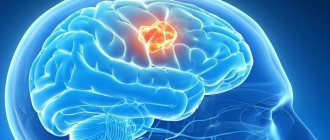Memory loss, which may concern only certain memories of a person or generally all events occurring in the past, is called amnesia. Sometimes the patient forgets information for a short period of time, and in some cases he cannot remember anything from what he previously experienced for a long time.
Amnesia can be complete or partial. If, with absolute loss of memory, a person forgets all the events that occur, then during partial amnesia he retains vague images or fragments of some facts that he cannot put in order in time or space.
Lost in delirium
This story happened a few months ago. Colleagues from the Ukrainian “AiF” received a call from Kirovograd and were informed that their help was needed: in a local psychiatric hospital there was a man who had lost his memory.
Alexey (as he called himself) got off the train in the Kirovograd region and, approaching a man in a police uniform on the platform, said: “Help. I don’t know how I got here and why I’m here, I don’t know where I am. I don’t know who I am...” The police were surprised: it seemed he was neither homeless nor a drug addict. Strangely dressed: fresh uniform camouflage pants and a ridiculous jacket. He’s not young anymore—about fifty years old. Instead of documents, there is a tattoo on the right shoulder: the inscription “Kandahar. 178. DShB. DRA. 197901985" - against the backdrop of an open parachute. There were no signs of the unknown person among the criminals in the databases. So he was sent to the hospital. There they established: “Amnesia due to brain contusion.”
— I am a citizen of Russia. My family lives there, I worked there until recently: Lieutenant Colonel of the Internal Troops of Russia... It seems I was going to meet my military friends. To whom? Don't know…
The patient bit by bit revealed new details from the past - the storming of Amin's palace, studying at the Ryazan Airborne School, conflicts in the Caucasus. But the most important thing - his name and home address - he could not remember.
“Help my people find me, tell them where I am, they are looking, they are worried. My fondest memory is meeting my future wife Anya,” Alexey told the journalist. - Blonde, thin... How she danced! We knew each other for three days and immediately decided to sign. The wedding took place in her homeland - in a village near Odessa.”
Then he remembered: “Anya works at the Rostov military hospital as the head of the therapeutic department, and teaches at the medical institute.”
A touching story, isn't it? AiF journalists and local Afghans called everyone, but could not find any trace of him anywhere. And one day, when we called Kirovograd, we found out that Alexey... had been discharged from the hospital.
“We still didn’t understand who it was and what his name was,” says Vladimir Kukharev, head. department of the Kirovograd regional psychiatric hospital. “They called the best doctors, psychologists, everyone worked with him, they couldn’t understand why he remembers some things and not others. And a week later he began to bully other patients, take away their things, and demand chifir. In general, a month later, at his request, we discharged him. They gave me money, put me on shoes and let me go. And after some time we received a call from the Kharkov psychiatric hospital. The legend of our patient who appeared there was the same.”
Doctors say that, most likely, our hero really suffers from memory loss, but he has gotten used to it and is now speculating on the disease.
Main types of memory loss
Regressive
Amnesia is not permanent, but temporary. Although the patient does not immediately remember old events from life, they are gradually restored. Sometimes some facts never return to the patient’s memory.
Stationary
This type of amnesia is persistent. The suffering patient forgets some events in life in general, and they remain lost forever.
Progressive
In this case, memory loss occurs gradually. At first the patient remembers a lot of information from the past, but over time he forgets it. Erasing data from memory is accompanied by the inability to remember new facts and events. Information from childhood is retained the longest, as well as skills acquired through human experience.
This is because when the brain is damaged, the first memories to be lost are those that accumulate in new areas. And more ancient brain structures are resistant to erasing information, so even in old age people remember the history of childhood better than adulthood.
Fixation
This type of amnesia does not allow the newly received data to be recorded in memory. Thus, a suffering person immediately forgets where he is, he may forget that he did not light a match after turning on the gas burner, etc. Fixative permanent amnesia makes the patient helpless and requiring constant care and control.
You should know that memory loss is not always associated with organic lesions in different areas of the brain responsible for storing information received during life. Sometimes people experience dissociative amnesia, which causes them to lose data for the last period of time due to the loss of a loved one or mental trauma. But under hypnosis the patient remembers everything. And with a dissociative fugue, the patient experiences instant memory loss due to psychogenic factors. But then the old forgotten information may be completely restored, but the loss of data from the fugue period is possible.
It happens that the patient replaces lost memories with fictitious ones that do not correspond to reality or with distorted facts.
Erase at will
Four years ago, Nikolai “found himself” in Chelyabinsk. He didn't remember anything about where he came from or who he was. The only document of the forgotten past for Nikolai was a bus ticket from Magnitogorsk to Chelyabinsk. It was in the sports bag that Nikolai had with him at the time of his “awakening.” After a long but unsuccessful treatment in one of the Chelyabinsk clinics, he decided to pull this particular thread and went to Magnitogorsk, to the city psychoneurological hospital.
Compassionate people sent a request to the “Wait for Me” program. Nikolai's family was found - a wife and two children. It turned out that he is a resident of the Orenburg region, who has been hiding from his family for two years. According to the chief physician of the regional psychoneurological dispensary No. 5, Alexander Belikov, there was so-called amnesia-repression, when a person deliberately erases certain facts of his life from his memory. In this case, the family played this role.
A 16-year-old murder was practically solved by police officers of the Ingodinsky district department of internal affairs of the city of Chita. In November 1992, a resident of the city of Nerchinsk, Trans-Baikal Territory, Alexander Sh., who was visiting relatives in the regional center, quarreled about something with the owners of the apartment. Having a pistol with him, the belligerent young man opened indiscriminate fire at the women in the house. One of them was killed, four more were injured of varying degrees of severity. It was not possible to find the criminal without delay. The criminal case was suspended, and Alexander Sh. left Transbaikalia and wisely moved to Moscow. The case took a new turn when the criminal turned for help to the editors of the “Wait for Me” program on Channel One. The killer himself became a victim of a robbery and partially lost his memory. As the press service of the Internal Affairs Directorate of the Trans-Baikal Territory reported, for some reason Alexander was denied participation in the popular program. However, they recommended that he contact the program “Man and the Law,” which he did. Unfortunately for the criminal, the footage from the Serbsky Institute was seen by an employee of the criminal investigation department of the Ingodinsky police department of Chita. In the story, Alexander said that he does not remember his relatives, but remembers the city of Nerchinsk in the Trans-Baikal Territory, which most likely is his homeland. Thanks to the transfer, Alexander and his relatives were found, who subsequently brought the man to Chita. Here the murderer, who had lost his memory, was detained by the police. As the press service of the Trans-Baikal Investigative Department of the Investigative Committee of the Investigative Committee reported, Alexander remembers that evening when he was visiting in Chita. However, he denies the fact that he opened fire on five women. After a forensic psychiatric examination, investigators will have to find out whether this is a means of protecting the suspect.
Films in which the heroes FORGET EVERYTHING
"The Bourne Identity" Due to a failed assassination attempt, Matt Damon's hero forgets that he is a super-agent.
"50 First Dates" Drew Barrymore's character, after a car accident, is able to remember the events of only one day.
Total Recall Arnold Schwarzenegger's character has his memory erased because he knew too much.
“Atlantis” The main character, played by Nelly Uvarova, gets hit on the head and forgets everything, including her time in prison and the birth of her daughter.
“The Hunt for Cinderella” The heroine of Amalia Mordvinova gets into a car accident and loses her memory.
"Return to Eden" Amnesia was the result of falling into the mouth of a crocodile.
Those who don't remember themselves
Those who have lost their memory regain it thanks to specialists from the State Scientific Center for Social and Forensic Psychiatry named after. Serbian. Over the course of several years, 40 people visited there; in six patients, memory was completely restored. AiF learned who erases memory and why from the famous psychiatrist, deputy director of the center, Professor Zurab Kekelidze.
— Zurab Ilyich, why do people suddenly lose their memory?
“We found out that this is the result of criminal actions.” Most often they hit the person on the head so that the person loses consciousness, and then they give special drugs (sometimes they are injected into a vein). In some cases, psychological influence is used. And the goal is one - to rob. Or lure out an account number, force you to sign some papers. None of the victims experienced memory loss at home (woke up in the morning and forgot everything) or after a scandal with relatives, none of them drank to the point of unconsciousness. Here's a typical case. The man was passing through Moscow. At the station, while I was waiting for the train, I decided to go to the buffet. He took the coffee, put it on the table and went to get the shortcakes. When I returned back, two people were already standing at the same table and talking. The man, having barely sipped his coffee, felt bad and decided to go out into the fresh air. Strangers follow him: “What’s wrong with you? What is your name?" And then for those around him: “Let’s call my wife,” etc. When they, supporting the almost insensitive unfortunate man, left the station building, everyone had the impression that these were just friends. And the man was taken further around the corner and there they took away his passport and money. When he came to, the victim did not even remember what city he was in. And I remembered this whole story after treatment.
—Who most often becomes a victim?
— Men from 16 to 55 years old.
Causes of amnesia
Now we have come to the part to answer the question of how to induce amnesia. There are many reasons that can lead to impaired or partial loss of memory. These factors can be divided into 2 large groups:
- Organic. This type includes:
- Closed head injuries (bruise, blow or severe concussion). As a rule, the victim remembers events that occurred before the injury, but the moment of injury and after it disappear from his memory
- Acute pathology of the central nervous system or brain (cerebral ischemia, oxygen deprivation, stroke, tumor formation or serious impairment of cerebral blood flow)
- Alcohol and drug intoxication. You can notice how, after drinking too much alcohol, the next day a person is unable to remember yesterday’s events, confusion occurs, which is accompanied by tremors of the hands and trembling of the eyeballs
- Taking medications that have a strong effect on a person’s psyche, for example, frequent or single use of sleeping pills or antidepressants
- Psychogenic (psychological). This group includes:
- Stressful situation or psychological trauma
- Epilepsy
- Psychological diseases
- Emotional shock
Almost all of these factors occur during stress, and the human brain tries in every possible way to forget these negative memories. If we take an example of a disease such as epilepsy, memory loss occurs directly during an attack, when a person is completely unable to control himself.
I remember here, I don’t remember here
- They all forget the same thing: who am I, where, where from?
- No, in different ways. Some people don't remember their past. For others it is more serious - the instinct of self-preservation is violated. A man came to the police and said that he felt bad. They can't understand what's wrong with him. “Does something hurt?” - “No, it doesn’t hurt.” It's bad and that's it. Some compassionate people were found, they poured tea, gave me a roll, and called a doctor. And when he drank tea and ate a bun, he realized that he was just hungry - that is, he had lost his basic instincts. Or a husband who has lost his memory does not understand what to do in the bedroom with his wife, how to have sex, and generally why it is needed.
Others cannot distinguish living from non-living. For example, it seems to a person that a train will jump off the rails and rush towards him. Or they forget individual letters and lose the ability to form them into words, while retaining much more complex skills. For example, driving a car or knowing how to swim. It’s rare, but it also happens that a person looks at himself in the mirror and doesn’t recognize him.
Here's an interesting thing. Some insist that they be shown on television. They are afraid that they have committed some kind of crime (even though none of them actually committed anything) and want to be punished. Consequently, morality does not depend on the presence of memory.
— How can you protect yourself from such interventions?
- Since there is a method by which you can erase your memory by drinking some substance, then you should not drink or eat with strangers. So they ask: what should a girl do at three in the morning in a vacant lot when she is attacked by a rapist? A girl doesn’t need to be in a vacant lot at three in the morning. Then he won't attack. The approach is the same here. Why are there only three women among those who have lost their memory, and they ended up in this situation completely by accident? Because women have a better developed instinct of self-preservation, women’s behavior is safer, they are more intelligent creatures than men.
— What should people do if they find a person who doesn’t remember anything? — Call us on the hotline 8 (495) 637-70-70 , which works around the clock.
Effective methods for improving memory: medical help and independent work
The problem of memory loss begins to worry more people close to a person than he himself. The cause is most often the usual fatigue of the body. Mechanically, this can be explained as wear of parts. At the beginning, people simply forget why they went into the room, then a deeper process begins when they cannot remember a certain word. It may end in failure to recognize close relatives. It will be difficult to restore memory if the disease develops.
How to restore memory and attention quickly? The most important thing is to promptly contact a specialist who will conduct all the necessary tests and assess the patient’s condition. The most commonly prescribed mild medications are:
- Donepezil. Affects the development of activity, reduces dementia.
- Memantine. These are pills that improve memory and brain function and relieve depression.
- Bilobil. Based on glucose, which is beneficial for the brain and blood circulation.
- Vitamins of general action.
But alternative means have always been popular. If memory is bad, many people prefer traditional methods rather than prescribed pills. Experts give advice on how to restore a person’s memory using folk remedies:
- Walnut leaves. Pour 50 grams of leaves into a liter of boiling water, leave for 24 hours and drink 3-4 sips 3 times a day. The disease not only stops its progression, but can also disappear completely.
- Eleutherococcus. Boil the roots of the plant for 10 minutes. Take the infusion 4 times a day, 5 tablespoons.
- Thyme. Pour boiling water over a tablespoon of thyme and leave for about half an hour. The pleasant taste allows you to drink it like regular tea 3 times a day after meals.
These are the most common recipes for treating memory impairment in adults using traditional methods.
Alternative methods for treating memory impairment
Any alternative treatment methods should be discussed with your doctor. He will tell you how to improve your memory at home without harming your body. Incorrect prescription of folk remedies can cause allergies and subsequent problems. The main component of treatment is the use of medicinal herbs.
- Pounded calamus root is taken in dry form with warm water. Contraindicated for kidney disease.
- Elecampane root. A vodka tincture is made from it: a tablespoon of root per 0.5 liter of vodka. The tincture should stand for a month, after which you drink a spoon three times a day. It is strictly forbidden to be used by pregnant, lactating and people with diseases of the gastrointestinal tract or cardiovascular system.
- Rowan bark. Boil a tablespoon of crushed bark in one glass of water for 10 minutes. Strain, cool and drink a tablespoon three times a day.
- Clover tincture. Fill a liter glass jar halfway with grass, without compacting it, and fill it with vodka. After 2 weeks, take the infusion one tablespoon before bed.
- Sage and mint. Mix a tablespoon of raw material in half a liter of boiling water and leave overnight. Take a spoonful three times a day on an empty stomach for a month.
If there is the slightest deterioration in your general condition, consult a doctor immediately. There are interesting exercises for maintaining memory. They are suitable for all ages, as they involve several brain functions at once. Doctors did not find any contraindications for them.
- Using an organizer. No matter how much you want to load your brain with information, it also needs rest. There is no need to rummage through the darkness of memory to remember the phone number you said 2 weeks ago; humanity has thoughtful options for this.
- Reverse crossword puzzle. Try not just to solve the crossword puzzle, but to enter completely different words into it, but matching the letters. Believe me, after 7-8 words, you will be interested in filling out this pun.
- Hobby. It's never too late to start doing something new.
Myths about memory
Professor Kekelidze refutes the most common misconceptions. Is it possible, by influencing memory (taking it away and then selectively restoring it), to turn a person into a zombie, a biorobot? This is not about memory. Is it possible to make a person disabled by cutting off his hand? In the same way, you can influence the brain in various ways - hit it on the head, stop the supply of oxygen for a while, so that it does not die, but its intelligence decreases, and it becomes pliable and obedient. But it is impossible to selectively influence - that is, program to perform only certain actions.
— Is it true that after memory loss and its restoration, a person can suddenly speak foreign languages?
— This myth spread after the erroneous conclusions of German experts. Once upon a time in one of the southern cities of our country such a story happened. The man on the train was stopped by inspectors and asked to show his ticket. But the stowaway passenger could not understand what they wanted from him and why he needed a ticket. The controllers felt that something was wrong with him - the man did not look like an ordinary “hare”. Then they realized that the person had impaired memory. It was shown on TV. It was discovered that he was a former Soviet German living in Germany, where he disappeared. And after a while the man suddenly spoke in German. Everyone decided that after losing and regaining his memory, he acquired an extraordinary ability for foreign languages. After all, the victim was sure that he only knew Russian. In fact, knowledge of the language was just a memory. We conducted experiments that proved: there can be no improvement in memory from unknown substances that can “turn it off” and return it. When, after a disorder of consciousness, a person’s memory returns, he remembers only what he really knew.
— Does it happen that a person is hit on the head, and then he wakes up and discovers that he has psychic abilities?
This is a very popular stereotype. But I must disappoint: if, say, a person under the influence of severe stress suddenly lost consciousness, fell and hit his head, unfortunately, no extraordinary abilities will appear in him after that.











